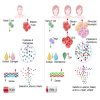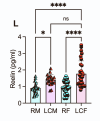Chandelier
Senior Member (Voting Rights)
Shima Shahbaz1 ∙ Mohammed Osman2,3,4,7 ∙ Hussain Syed5 ∙ Andrew Mason5 ∙ Rhonda J. Rosychuk6 ∙ Jan Willem Cohen Tervaert2 ∙ Shokrollah Elahi
Highlights
• Female long COVID (LC) patients show heightened immune activation and inflammation• Disrupted sex hormone levels differ between male and female LC patients
• Neuroinflammatory gene signatures may explain cognitive symptoms in females
• Sex-specific biomarkers suggest need for tailored LC therapies
Summary
Long COVID (LC) manifests with sex-specific differences, particularly in those with myalgic encephalomyelitis/chronic fatigue syndrome (ME/CFS).Our study reveals that female LC patients (LCF) with ME/CFS show a shift toward myelopoiesis, reduced lymphocytes, increased neutrophils/monocytes, and depleted regulatory T cells—suggesting persistent immune activation.
Elevated CD71+ erythroid cells and disrupted erythropoiesis contribute to fatigue and tissue damage in LCF. Cytokine profiling indicates a stronger pro-inflammatory response in LCF compared to males (LCM), along with markers of gut barrier dysfunction.
Hormonal analysis shows reduced testosterone in LCF and estradiol in LCM. Transcriptomic data reveal neuroinflammatory signatures in LCF, potentially explaining cognitive symptoms.
We also identify biomarkers that distinguish LCF from LCM and correlate with sex-specific clinical symptoms.
Overall, LC with ME/CFS is characterized by sex-specific immune, hormonal, and transcriptional alterations, with females exhibiting more severe inflammation. These insights underscore the need for sex-tailored interventions, including consideration of hormone replacement therapy.
Graphical abstract




